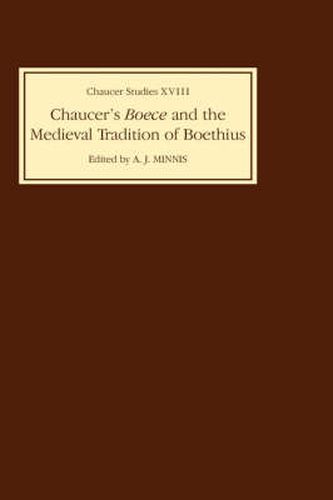Readings Newsletter
Become a Readings Member to make your shopping experience even easier.
Sign in or sign up for free!
You’re not far away from qualifying for FREE standard shipping within Australia
You’ve qualified for FREE standard shipping within Australia
The cart is loading…






This collection seeks to locate the Boece within the medievaltradition of the academic study and translation of the Consolatiophilosophiae, thereby relating the work to the intellectual culturewhich made it possible.It begins with the fullest study yet undertakenof the Boethius commentary of Nicholas Trevet, this being a majorsource of the Boece. There follow editions and translationsof the major passages in Trevet’s commentary whereNeoplatonic issuesare confronted, then Chaucer’s debt to Trevet is assessed in a detailedreview. The many choices which faced Chaucer as a translator are indicated and the Boeceis placed in a long line of interpreters of Boethius in which both Latin commentators and vernacular translators played their parts. Finally, a view is offered of the Boece as anexample of late-medieval “academic translation’: if the Boeceis assigned to this genre, it may be judged a considerable success.
$9.00 standard shipping within Australia
FREE standard shipping within Australia for orders over $100.00
Express & International shipping calculated at checkout
Stock availability can be subject to change without notice. We recommend calling the shop or contacting our online team to check availability of low stock items. Please see our Shopping Online page for more details.
This collection seeks to locate the Boece within the medievaltradition of the academic study and translation of the Consolatiophilosophiae, thereby relating the work to the intellectual culturewhich made it possible.It begins with the fullest study yet undertakenof the Boethius commentary of Nicholas Trevet, this being a majorsource of the Boece. There follow editions and translationsof the major passages in Trevet’s commentary whereNeoplatonic issuesare confronted, then Chaucer’s debt to Trevet is assessed in a detailedreview. The many choices which faced Chaucer as a translator are indicated and the Boeceis placed in a long line of interpreters of Boethius in which both Latin commentators and vernacular translators played their parts. Finally, a view is offered of the Boece as anexample of late-medieval “academic translation’: if the Boeceis assigned to this genre, it may be judged a considerable success.